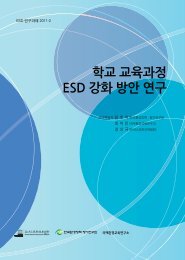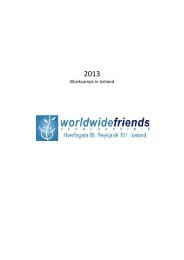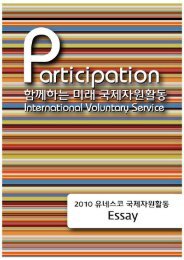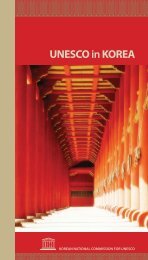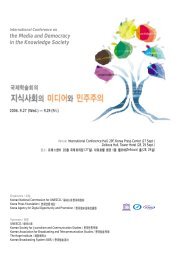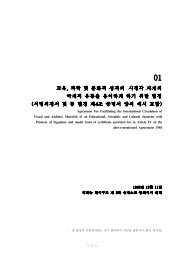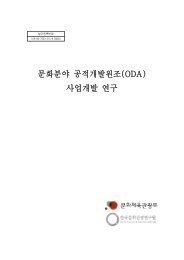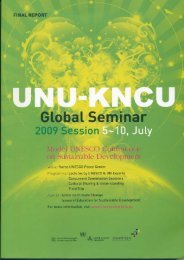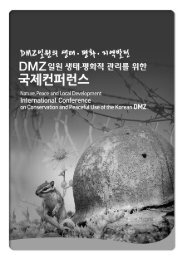íëìë³´ë2012문íì ë°ì ë¼ì´ëí ì´ë¸.pdf - ì ë¤ì¤ì½íêµììí
íëìë³´ë2012문íì ë°ì ë¼ì´ëí ì´ë¸.pdf - ì ë¤ì¤ì½íêµììí
íëìë³´ë2012문íì ë°ì ë¼ì´ëí ì´ë¸.pdf - ì ë¤ì¤ì½íêµììí
Create successful ePaper yourself
Turn your PDF publications into a flip-book with our unique Google optimized e-Paper software.
Presentation<br />
Strengthening the Role of Culture in the Post-MDGs Framework<br />
Lynne Patchett<br />
Chief of the Executive Office, UNESCO Culture Sector<br />
Good afternoon Ladies and Gentlemen,<br />
I would like to begin by thanking the organisers of this international symposium on<br />
Culture and Development: the Korean National Commission for UNESCO and the Korean<br />
Ministry of Culture, Sports and Tourism, as well as the Korean International Cooperation<br />
Agency for co-sponsoring this important meeting. It is both a pleasure and a privilege for me<br />
to be invited here today.<br />
In his presentation this morning, Professor David Throsby eloquently focused on creative<br />
industries and their multi-faceted contribution and value for sustainable development. My<br />
presentation picks up on his last point about the challenges ahead at the international level,<br />
and of “effective integration of culture in sustainable development, together with crosscountry<br />
evidence-building, to strengthen the understanding of culture’s contribution to<br />
development in post 2015.” To do so, I will share with you the work that UNESCO has been<br />
undertaking both at the institutional level and in the field, to awareness raise about the<br />
importance of culture for development, in order to include culture in the post-2015<br />
international development agenda. Why? Because we have examples from the field that show<br />
us that it works.<br />
Before embarking on this, allow me briefly to set the context.<br />
As you know, UNESCO is the UN Specialized Agency with a specific mandate and<br />
expertise on culture. We have developed a comprehensive set of normative instruments in<br />
the area of culture, ranging from tangible heritage (1972 Convention), intangible heritage<br />
(2003 Convention), and underwater cultural heritage (2001 Convention), but also illicit<br />
international trafficking of cultural property, the protection of cultural property in the event of<br />
armed conflict and (1954, 1970 Convention), cultural industries and the diversity of cultural<br />
expressions (the 2005 Convention).<br />
Through these Conventions and Recommendations and associated operational<br />
programmes, UNESCO contributes to building the capacity of cultural institutions at country<br />
level, networks of professionals, communities, and to the development of norms, standards<br />
and legislation in all culture fields.



